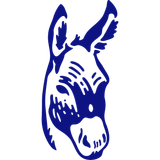Elijah
by Brenda Miller | At Passover, opening the door to possibility.

We’ve dipped the bitter herb in salt water and slathered our matzo in charoset. We’ve forked apart the tender matzo balls in their clear broth, and we’ve eaten the roast chicken. We’ve fingerprinted the plagues on our plates with grape juice. We’ve poured four cups of wine, and now a fifth.
My father rises from the table and opens the kitchen door.
At Passover we celebrate the way God protected us from his wrath and directed it instead to our enemies; by opening the door to the night, we say that we still, and always, believe in this divine protection. Even if we don’t believe. Even if we’re confused about why we ask for protection from the very force that threatens us. Even if our faith has diminished, we keep opening that door.
Or perhaps it is the front door. Or maybe we’re not in our own home at all, but at our cousin’s house, where the dining room is larger and the table big enough for twelve. But I’d like to imagine it at our own table, the door open to the spring twilight, the nearly full moon. Elijah has his own place setting—with the fancy wine glass, encrusted in brass, brought out for the occasion, filled to the brim with Manischewitz sweet wine.
My father sits back down and calls for him: Elijah! Not a command, exactly, but a wheedling, a lure: Elijah! Come inside!
I don’t know what he looks like, Elijah. Most likely, your standard-issue prophet, with long beard and robe, a way of walking that makes every step intentional. Every year, I think I might glimpse him out of the corner of my eye, an apparition slinking past, something you can’t witness directly. But I know it’s really not Elijah’s appearance that matters so much; it’s these few moments of waiting: the space between what we know for sure and what we can’t know at all.
In a few seconds, the table shakes and Elijah’s wine subsides a millimeter in the glass. We all clap, and my father laughs; he gets up to close the door tight against the night, but a wisp of Elijah’s presence remains.
Years later, now that my father is gone, I picture Elijah in my father’s flesh: with his wide grin, his dimples, his crooked teeth, his ha-ha-ha laugh. He bows his head—embodied and disembodied, pretends to drink to please us. And perhaps that’s what Elijah’s been all along: the ghost of all we love, come back to join us.
Brenda Miller's most recent book is A Braided Heart: Essays on Writing and Form. She is the author of five more essay collections and a coauthor of Tell It Slant: Creating, Refining, and Publishing Creative Nonfiction. She is a professor in the MFA program at Western Washington University. Her website is brendamillerwriter.com.
* A version of this essay first appeared in Isthmus Review #7 (2018). Illustration by Anna Hall.






